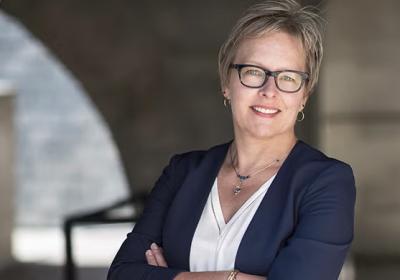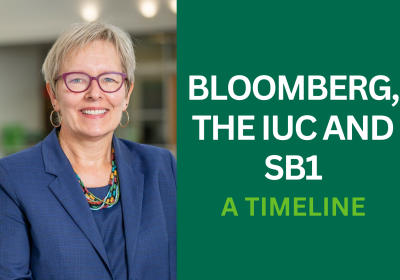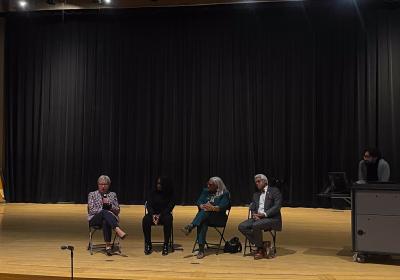
Student concerns, Israel-Palestine, budget discussed at CSU senate
Cleveland State University’s faculty senate met on Wednesday, Nov. 8 and covered several topics, including CSU’s budget, criticism of the university’s recent statement on Israel-Palestine, and campus harassment.
Student Concerns
Kayland Morris, president of CSU’s student government (SGA), told the faculty senate of student concerns at Cleveland State, given the current political climate around the Israel-Palestine violence.
Morris said that some students are feeling unsafe on campus due to harassment of students both in-person and online. She noted that the harassment has included posting images and videos of students, and said that students are asking why the University hasn’t made a statement on this issue.
Morris added that the SGA has heard from students who are unsatisfied with CSU’s letter on the violence in Israel-Palestine. She noted that students have reached out to the CSU’s Community Assessment Response and Evaluation (CARE), a University resource which helps connect students support services, and have not received a response.
“This is disheartening to hear as a student leader because before a resource is provided it should be known beforehand that this resource would be immediately present for students in the midst of this tragedy,” Morris said.
Morris said that it would be “great if administrators would address the fact that students are going through a difficult and emotionally draining time and need leniency when it comes to absences and submitting classwork.”
She said that the student government has heard of students being deducted points in classes that they missed in order to attend funerals and comfort their families.
In response to Morris' statement, CSU Vice President of Student Belonging and Success, Tachelle Banks, Ph.D., who is also a member of the CSU president's cabinet, said the university is setting up an ad hoc committee to "focus our attention a bit more closely on these concerns." She added that her office was expanding options for students to report their concerns.
Israel-Palestine
CSU President Dr. Laura Bloomberg, speaking ahead of Morris at the senate meeting, acknowledged criticism of the University’s open letter regarding the escalating violence in Israel-Palestine.
The open letter posted Oct. 13 addressed the Oct. 7 attack on Israel by Hamas, noted CSU's counseling resources and said that Bloomberg has encouraged CSU's leadership to connect personally with students impacted by the rising violence in Israel-Palestine and point them towards resources.
Bloomberg told the senate that she knew of calls for her to "say more about issue A or issue B or say less about everything," adding that students had that right, and that was a right she welcomed. But she said she did not "feel compelled to issue another statement about what's happening in Israel or Gaza."
CSU student group, Students for Justice in Palestine (SJP), had responded to CSU's Oct. 13 letter in a statement posted to their Instagram account on Oct. 25 noting that the letter "did not contain a single mention of the thousands of Palestinians who have lost their lives in this long-standing conflict," and questioned "why similar statements have not been made during similar loss of human life in Gaza over the last 15 years."
The group followed that up with a second Instagram statement on Nov. 7 addressed to CSU’s office of Diversity, Equity and Inclusion and CSU’s CARE team in addition to Bloomberg. The statement shared SJP’s concern that the University had not responded to what it called “the growing unsafe, tense, and dangerous environment for the Arab, Muslim, and Palestinian community.”
Bloomberg told the senate she and the administration were working with the CSU Police Department and campus safety team to ensure the safety of all students on campus and ensure CSU was a place where they could voice their opinions in a safe and mutually respectful way.
"I'm very proud of our student actions," Bloomberg said, and "proud of their engagement with the world."
CSU’s Budget Deficit
Dr. Anup Kumar, president of the faculty senate, raised the role of shared governance in addressing the university’s budget deficit.
“In the game of shared governance, (the faculty’s) role is to provide the feedback and make recommendations,” Kumar said.
Kumar urged attendees to familiarize themselves with CSU budget data by talking with their department chairs and familiarizing themselves with CSU’s budget books.
President Bloomberg noted Kumar's contribution and outlined the administration's goal.
“It’s really important to me that we’re not just talking about budget cutting,” Bloomberg said. “We’re talking about planning for a resilient future where we are financially stable, but where we can also ebb and flow and breathe.”
Bloomberg said that the administration is continuing to prepare a budget for the fiscal year 2025, and echoed Kumar’s calls for faculty participation. She discussed how nearby higher education institutions are dealing with financial difficulties, and noted that CSU may “at some point in the future talk about things like mergers or acquisitions.”
Searching for Consultants
Bloomberg also noted that the University, following a recommendation from the board of trustees, is seeking a higher education consultant “to help analyze data, identify priorities, look at national trends, and think about what recommendations (should be made).”
Acknowledging that some may have concerns about whether the use of consultants could subvert shared governance, Bloomberg stated that the consultants “do not make our decisions for us,” and that is “the purview of the leadership, the faculty in shared governance, and certainly our board of trustees.”
Regarding the cost of the consultant, Bloomberg said, “When you’re looking for excellence, it’s not cheap.” She said that the goal of the University is not to use operating funds to pay for the consultant, but rather to “seek outside support from community partners.”
The next faculty senate meeting will take place on Dec. 6.










